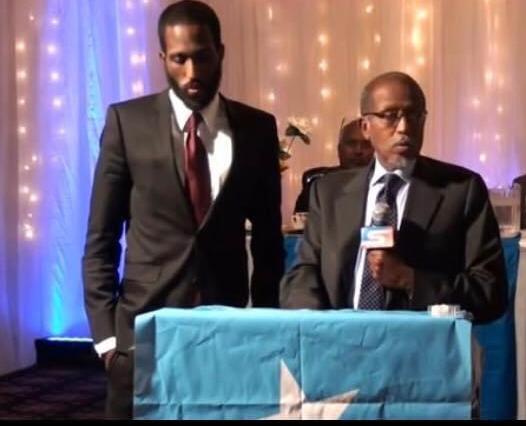
Earlier this week, Dr. Ali Khalif Galaydh passed away in Jijiga, Ethiopia. For many Somalis, he was a methodical statesman, a brilliant orator, and a champion of Somali nationalism. He was Aabo for me, Milgo, Waleed, and Aisha. Growing up in Upstate New York, I knew very little about Aabo’s work as a troublesome five-year-old. I simply wanted Aabo to entertain me instead of discussing siyaasada. One evening, CNN highlighted Somali children starving throughout Somalia in the aftermath of the Civil War. I could not believe children who looked like me were fearing for their lives. In that indelible moment, Aabo passionately explained he was busy with siyaasada to help create better opportunities for all Somalis.
I am so proud of what Aabo tirelessly invested in his motherland. Aabo easily could have avoided Somali politics and maintained one of his professorships. Even in-between his professorships, he established a telecommunications company that is still around today. Aabo’s continual thirst for knowledge impressed me far more than what his CV detailed: this was a man who read numerous newspapers a day, has a collection of thousands of books, and who charmed a Polish cab driver in New York City about the history of his small municipality.
Now, at 31, I am largely cynical of the political trajectory of Somalia. For the past 10 days, I’ve been able to absorb Mogadishu for the first time while grieving. A common indictment on the United States has been the socioeconomic divide between the haves and the have nots. In Mogadishu, I see a more painful divide — businesspersons and members of parliament (MPs) have consciously embraced the chaos for power and massive monetary gains while thousands aimlessly wander a war-torn capital. How is it that the onlycountry on the African continent with a homogenous population and one religion is moving at a snail’s pace nearly 30 years after a Civil War? What would the great Sayid Mohammed Abdullah Hassan say today?
Qabil is a double-edged sword for the Somali people. The Political Scientist Joel S. Migdal has argued that developing countries that have strong societies typically have weak states. Professor Migdal’s assertion could not be truer for Somalis. We are a people who can laugh and bicker sans a centralized state. A centralized state would provide two essential needs for Somalis – a security apparatus and a national constitution. If regional and national leaders do not address the aforementioned needs, other state actors will continue to divide the country and puppeteer their respective agendas.
I have two suggestions with national elections a few months away, 1) regional leaders should fully embrace federalism and national unity and 2) Somali academics should play a larger role in regional and national politics. Regional leaders must now bolster President Mohamed’s government in Mogadishu. A united Somalia is the only viable solution. We areone people. Additionally, it is baffling women have played such a limited role in regional and national politics. As Somali men in the diaspora go through melodrama, Somali women are busy outnumbering them in undergraduate and graduate programs.
I felt unity during Aabo’s janazah. I would like to thank the Somali federal government and the various regional delegations for facilitating Aabo’s state-sanctioned janazah and burial in Mogadishu. Aabo will not see a united and prosperous Somalia; there’s a fair chance we also will not see it if we do not seize the moment.
Warsame A K Galaydh
Warsame is an attorney and the son of the Late Ali Khaliif Galaydh.